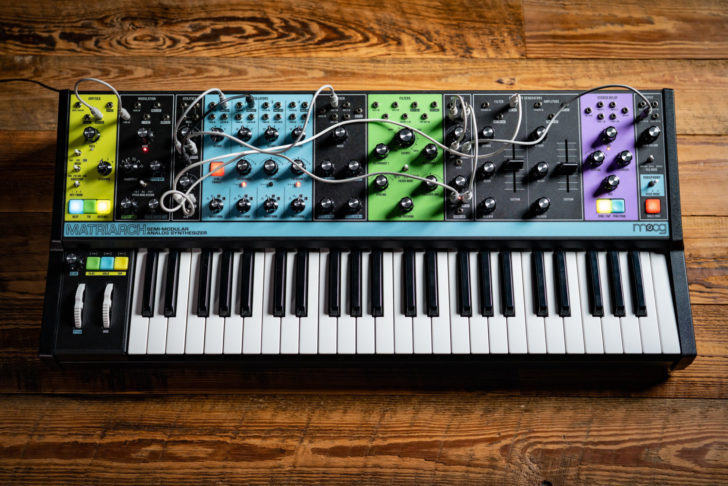
Moog Music has announced that their latest synth, the Matriarch, is now available.
The Moog Matriarch is a patchable 4-note paraphonic analog synthesizer with a built-in Sequencer, Arpeggiator, stereo Ladder Filters and stereo Analog Delay. The keyboard is based, in part, on analog circuit designs from vintage Moog synth modules, but also incorporates influences from their other recent keyboards and Eurorack module designs.
Here’s an audio demo, created by synthesis Lisa Bella Donna. The performance combines the Matriarch with Moog DFAM, Mother-32, and Grandmother synths:
Pricing and Availability
The Moog Matriarch is available now with a street price of about $2,000.

Lisa Bella Donna knows how to sell the Moogs! Love everything she’s done so far.
Whew… $2k :-/
There’s been 2 recent product announcements (with digital hearts) that could rival this.
Also – not forgetting Behringer’s latest forthcomings
That’s what i’m thinking. I’d expect at least a double Grandmother but not some keys and two more oscillators. Some will buy anyway. Like you said: Many more good synths this autumn to try. Bye Moog…..
This basically is a double Grandmother. It’s just configured a bit like a stereo MonoPoly.
Yes, luckily there is a variety of instruments available these days. But if you find yourself in a position where a polyphonic wavetable synth like Hydrasynth „rivals“ a semi-modular analogue paraphonic synth like Matriarch, I wonder what your criteria are? Are you looking for an instrument to achieve a particular sound or workflow, or do you just want to own ANY synthesizer?
C.R.E.A.M- Cash rules everything around me. When I read that someone becomes instantly uninterested in a great synth because of the price, thats when its funny. Its not “Thats expensive, wish i could buy it” but “Thats expensive, doesn’t even sound good and Behringer…..”
I honestly dont think anyone cares about the sound, it you can afford it, you can own it and you’ll make it work, unless it’s missing a bunch of features that fits your exact needs, then that price needs to be really really low, like Behringer.
Right? “That new Porsche 911 is crap because it’s expensive and doesn’t have four wheel drive!”
You’re referring, of course, to the Modal synth and the Hydrasynth. Both look like interesting instruments; the Hydrasynth, in particular. I will hopefully purchase the Hydrasynth, but if I had the cash, I would also get the Grandmother, because it is a completely different instrument that sounds incredible and looks like a lot more fun to use than the Hydrasynth.
They are not competitors. In fact, instrument design is not a competition, (although you wouldn’t know it from message boards and comments sections of the past five years). If one cannot see the difference between the Hydrasynth and the Grandmother, I dread ever hearing that person’s music.
The Hydrasynth and Modal synths *are* competitors. They’re completely different than the Moog, but musicians have a limited budget. If I buy the Modal Argon8, I can’t afford either of the others.
Are you really judging musicianship based on knowledge of a couple of synthesizers???
It sounds great and performance is really interesting and excellent.
Obviously would be great if you can those sounds out of cheaper synths and I think its not exactly the hugest market that care so much about the details of the sounds so its understandable to me if you work to make a unique and usable sound you want to get paid for it.
But lets talk about that setup…OMG. …she lives in a kind of synth Xanadu.
Please stop with the price stuff. Compare this to any similar Eurorack configuration and it becomes immediately clear that this *incredibly* well priced.
If you want a digital synth and all of the good things that come with that sort of thing, great. Wavetables are great. Presets are great. Full polyphony is great. This is just something different. Getting on the Internet to talk shit about things that don’t relate to you is just a waste of everyone’s time at best and more needless ugliness/divisiveness at worst.
Moog pays their employees well. They have health insurance and own a piece of the company. To top it all off, they build this stuff right here in the USA, using top quality components.
Behringer does not build his stuff in Germany for some reason. Humm. I wonder why? It is a mystery!
On the other hand: Behringer (and many other manufacturers) ship their synths from China directly to their destination. Moog first imports most of the electronic parts from China to the US, then ships the assembled synths from there. So at the time you buy a Moog in Europe, it has practically travelled twice around the globe. Nice for US workers perhaps, but not so nice for the environment. Bottom line: It’s complicated.
Is anybody put of with the whole mother thing? It’s so Freudian, I don’t know where to start.